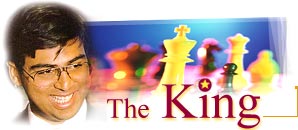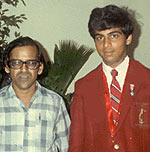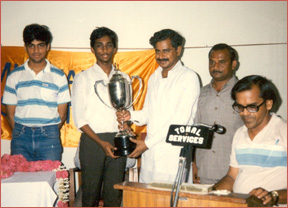
'The turning point in Anand's career was the Candidates match against Alexei Dreev, in Madras in 1991'
V. Kameswaran, the vice-president of the Tamil Nadu Chess Association, literally saw
Vishwanathan Anand grow up from an eight-year-old boy, who cried after making a wrong move, to the king of chess. He had unofficially coached Anand and also accompanied him to various tournaments. It was he who wrote the first article on Anand, for The Indian Express, in 1981!
 In the just-concluded World championship, Anand was leading 2.5-0.5 against Alexei Shirov. It was a Saturday, and The Hindu chess correspondent asked Kameswaran about the Indian Grandmaster's chances. He replied, "I don't expect him to miss out on this chance. He may win on Sunday itself." The Hindu reported the coach's prediction.
In the just-concluded World championship, Anand was leading 2.5-0.5 against Alexei Shirov. It was a Saturday, and The Hindu chess correspondent asked Kameswaran about the Indian Grandmaster's chances. He replied, "I don't expect him to miss out on this chance. He may win on Sunday itself." The Hindu reported the coach's prediction.
Came Sunday, and Anand did win the world crown.
In a conversation with Shobha Warrier, Kameswaran looks back on his days with the Madras meteor. Excerpts:
Do you remember the first time you noticed Anand?
Of course, I remember. He was very small then. Must have been eight or so. I saw him participating
in two tournaments before he moved to Manila with his parents; and in one of the tournaments, he wept because one of his moves was bad! In the very next tournament conducted by the Tamil Nadu
Electricity Board, he played very well, better than what he did in the earlier one. Considering his age
and the interest he had in the game, he was given a special consolation prize. That day itself, I felt
that he was capable of reaching greater heights.
What exactly about his game impressed you?
He looked and behaved very intelligently. Even though he was only eight, he played like a 15-year-old. But it was quite evident that he lacked practice in playing tournaments. He used to be very
nervous in the beginning of play and picked up courage as the game progressed.
What changed his fortunes was his father's stint in The Philippines. Had he remained in India, I am not sure whether he would have developed into such a fine player or not. We must thank his father's job, I think. Those two years in Manila had an amazing impact on Anand as a chess player. Because the first Asian champion was from Manila, the television networks there gave a lot of importance to chess. So, in those two years, he watched numerous great games and also played many.
By the time he came back, he was a totally different player; very confident and impressive. After
that, whenever a Grandmaster came to Madras, we would arrange for him to play against Anand.
Let me tell you another incident. This happened after he came back from Manila. Manuel Aaron was the national champion then and Anand defeated Aaron in a match. I feel he could do that at such a young age only because of the practice that he got from Manila. See, defeating the national champion at the age of 12 or 13 is not a joke. I also must tell you, in the very next match, I defeated Anand! [laughs]
Was it after that you became his coach?
I want to make this clear: I was not a paid coach or anything like that. Yes, I started taking more interest in him! I used to go to his father's Railway quarters quite regularly, just to talk to them. At
that time, he had a moped and he used to ride the bike inside the compound. In those days, he used to call me 'coach', 'master' etc! As the president of the Tamil Nadu Chess Association, I used to travel with him all over Tamil Nadu.
Was there any change in him as a person after he came back from Manila?
 There was no change in his personality at all. I also must tell you, he remains the same even after reaching such heights. He was a hero to everyone, even then. Unlike many other chess players, he was always very smartly dressed in colorful T-shirts. Above all, he was a charming boy.
There was no change in his personality at all. I also must tell you, he remains the same even after reaching such heights. He was a hero to everyone, even then. Unlike many other chess players, he was always very smartly dressed in colorful T-shirts. Above all, he was a charming boy.
You went with him to Helsinki as an official, didn't you?
Yes, I did go with him as an official and coach for the World juniors in Finland in the year 1984.
Till then it was his mother who used to accompany him. When she found it difficult to go, it was she
who suggested my name to the federation. She felt I would take care of her son well. I still remember she used to call us everyday from Madras to know how Anand played.
So, I was with him for nearly one month, day and night. Almost all the other players at Helsinki were
17 or 18 but he was only 15 then; still he played excellently.
I remember one incident very well. On the penultimate day, the organizers had arranged a sightseeing trip but as he had to play a match the next day, he refused to go. Imagine a young boy refusing to go sightseeing, that too to see a place that he had not visited before. He wanted to stay back and prepare for the next day's play. I am narrating the incident just to tell you how committed he was to the game. So, I too stayed back to give him company. We just walked around the lake and then played some billiards so that he would be fresh for the next day's game. He was very fond of billiards then.
On our return, we made a stopover at London to play some tournaments. As we were not given any
money to stay in London, we had to make our own arrangements. Luckily, we could stay with Augustine Aaron, cousin of Manuel Aaron.
For the first match, we were late. We reached there just ten minutes before the close. Had we been late by ten more minutes, he would not have been able to play the match. Mind you, Anand sat there and finished the game in ten minutes. And all those who had assembled there were taken aback to see the speed at which he played.
It was in London that he got his first IM norm and he was only 15 then.
In what way were you helping him with his games?
We didn't have computers then; we didn't know anything about computers too. The only reference
that we had then was books. While Anand played, I would make notes, then go through the books and
mark the necessary portions for his reference! Anand used to flip through the pages as if he was fast reading a James Hadley Chase, but later on he would tell me what was written in one particular
page. His photographic memory amazed me sometimes. But these days, you have to just go to the
Internet to see the details of all the important matches. Everything is so easy!
After getting the World junior title, his rise was phenomenal. He then became a part of the European
circuit, and later on, I was also a spectator who followed Anand's growth, like many other Indians. As an official, I used to receive him at the airport…I used to even organize exhibitions on Anand at
several places so that youngsters would get inspiration from him.
Now also you have organized an exhibition at the Tamil Nadu Chess Association premises ...
 Yes, it is done to show our appreciation of Anand becoming the World chess champion. I have
divided the exhibition into four parts: the first is lightning kid, then the chess wizard; the third
part is the chess king and the fourth is, Anand on the Internet.
Yes, it is done to show our appreciation of Anand becoming the World chess champion. I have
divided the exhibition into four parts: the first is lightning kid, then the chess wizard; the third
part is the chess king and the fourth is, Anand on the Internet.
How do you describe Anand's growth from a lightning kid to a chess wizard?
He was a lightning kid from 1981-1987, that is, till he became the World junior champion. From
1987 to his match against Kasparov, he was a chess wizard. After the Kasparov match, he became the chess King!
As a 'Lightning' kid, he had quick, lightning play in his command. If you look at a graph depicting his
growth as a chess player, you will find the graph going up except for a brief period in 1998. He has
been in the top three world ranking for several years now and that shows his consistency.
The turning point in Anand's career, according to me, was the Candidates match he played against
Alexei Dreev, in Madras in 1991. Both of them were junior players then but the way Anand
defeated Dreev made me look at him from a different angle.
You said till recently, Anand used to have problems playing several games against one player. How do you think he overcame that?
I was at Belgium covering the chess tournament for The Hindu and PTI, and I also closely watched his match against Kamsky at Sanghi Nagar. I noticed that he would play single matches brilliantly but if he were to play several games against one opponent, he would bungle in the second part. When you are playing several matches against one player, it is purely a psychological match but Anand used to fail in such crucial tournaments. I am happy that in the last 2-3 years, he has learnt to overcome the problem. I feel he learnt a lot in his match against Kasparov. He played brilliantly against Shirov in the World chess championship. It is all because of the thorough preparations that he had done before the match.
Here, I must congratulate Anand for retaining the experienced, 50-year-old Ubilava as one of his
seconds. He had a youngster as his second when he played against Alexie Dreev. When you have an
inexperienced, young second, you may lose out on experience. A coach or a second need not be a
world-class player but if he is an experienced hand, he will be able to guide the player very well. Even
though Anand lost against Kamsky at Sanghi Nagar, he continued to have Ubilava as his second and that decision helped him now, I feel.
You were the first person to write an article on Anand in 1982. Do you remember the meeting?
C S U Swamy, a former Olympic athlete was the sports editor of the Indian Express then. Other than a chess player and a chess official, I was covering chess tournaments also for the Indian Express then. It was he who asked me to interview Anand and write about him. He said, "This boy is going to do wonders in chess. Why don't you write about him?" So, I went to Anand's house and interviewed him! He first told me that his chess hero was Karpov, but do you know what he said next? He said, "If Fischer comes back, he will be my hero." It shows that he admired only the best and not the second best!
You told The Hindu that Anand would win the match on Sunday itself. Why were so sure that he would win that day itself?
When Arvind Aaron asked me, I said, he would win on Sunday itself. Somehow, I sensed that he would win that day itself. They had played three rounds by then. They drew the first round and Anand
won the next two rounds. Three more games were there but I felt Anand would go for a win on that
day. Yes, it was a risk that I took in predicting the result! Anyway, I am happy that I was right!
The Full Series